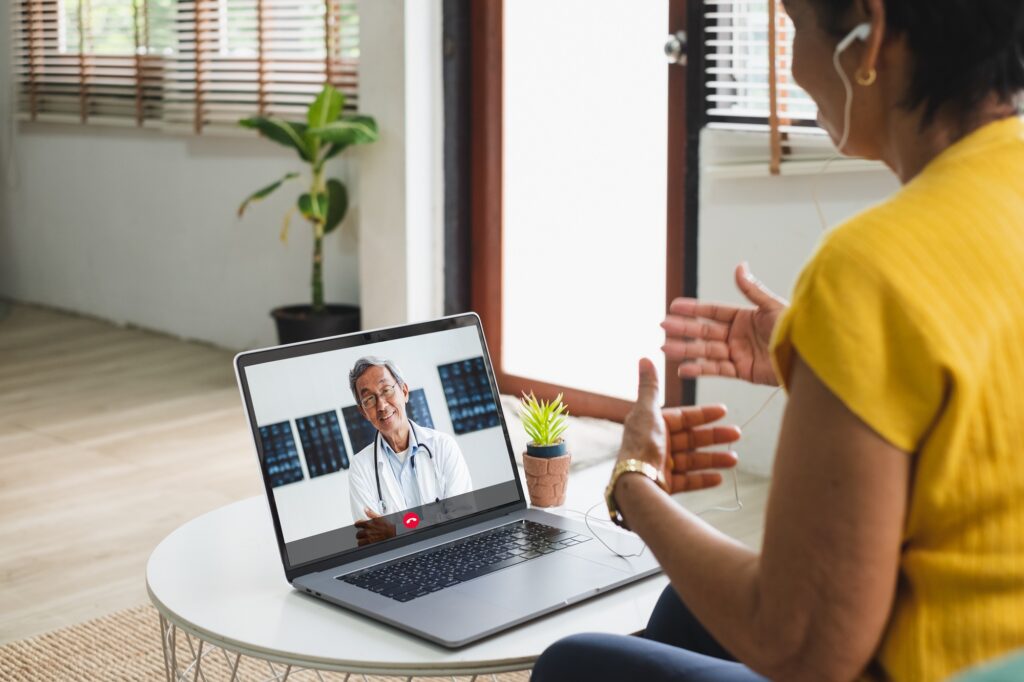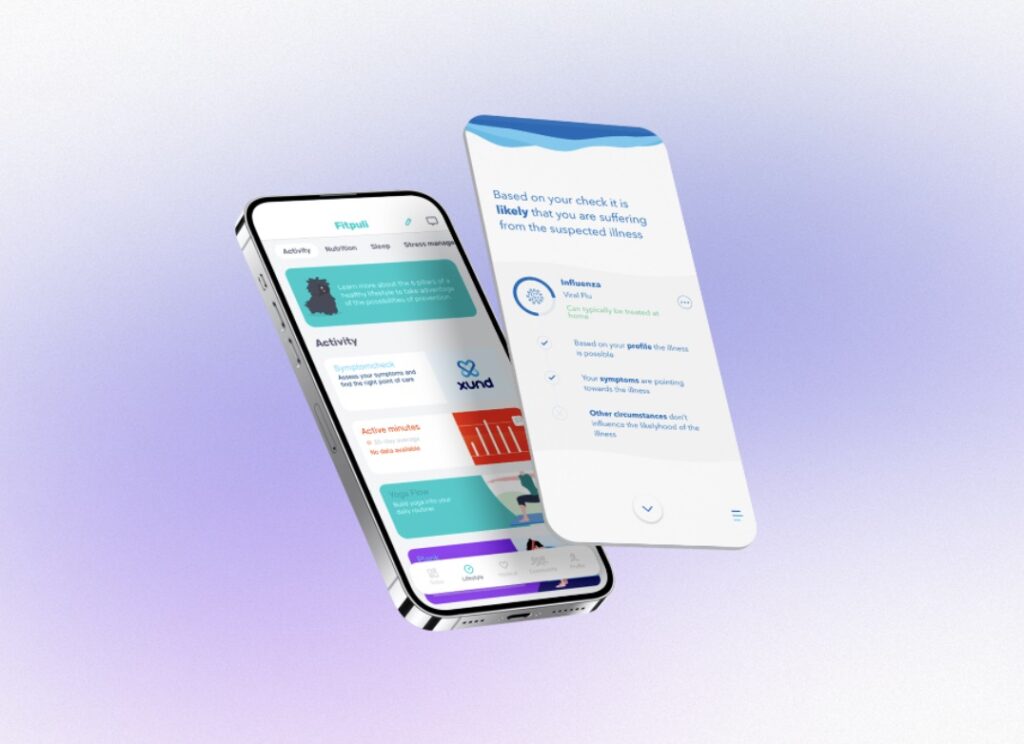Fitpuli and XUND join forces to address key challenges in healthcare
Lifestyle and health, telemedicine, and artificial intelligence come together when Fitpuli and XUND join forces to set a new direction in the digitization of healthcare. An interview with Tamás Petrovics, co-founder and CEO of XUND and Daniel Oláh, founding director of Fitpuli.
If you were to explain to your grandmother what XUND does, what would you say?
Tamás Petrovics: The patient can start the interaction with a symptom they are experiencing or a disease they think they might have developed. The algorithm then asks the patient about 20-25 simple questions, just as a doctor would. The aim is to use the questions to get a structured overview of the patient’s symptoms, medical history, medications, and so on. Based on this information, XUND’s technology identifies the most likely cause, calculates the probability of the suspected disease, and then makes a recommendation to the patient on where to go next.
Did you build the AI system you use from scratch? Tell us a bit about the process! How is the AI learning today?
Tamás Petrovics: Our algorithm uses NLP (Natural Language Processing) to analyze millions of unstructured medical publications and extract structured data about the relationships between diseases, symptoms, and other health factors. This data is validated by our medical team through qualitative publications before being entered into the system. These correlations enable our technology to identify patient health problems and make appropriate recommendations.
How did you meet Fitpuli, where do your activities meet, and how can you help each other?
Tamás Petrovics: We got in touch with Fitpuli at a conference and then also through a partner. We have been discussing a possible cooperation for a longer time, either on the Hungarian or even international markets, as our products complement each other well. What attracted me to Fitpuli is that it helps its users stay healthy in the long term, while XUND can provide reliable recommendations on the necessary steps to take, especially in acute cases. Thus, XUND allows Fitpuli to provide diagnostic decision support to its users, and Fitpuli can help XUND’s clients build a comprehensive digital platform through a well-tested, user-friendly interface. Fitpuli is focused on lifestyle, and on educating people about health, to which a more medically focused assistance engine is now linked.
How can the specific knowledge provided by XUND be combined with occupational health and why is this important?
Dániel Oláh: With Fitpuli, our basic idea was to strengthen the health promotion of working-age employees through the opportunities provided by our product. Occupational health care was a very good entry point for this, but this has since been complemented by additional services, insurance, and other well-being programmes. Of course, we will continue to focus on this area, as occupational health care is of paramount importance in the life of companies. Employees tend not to see a doctor until they have a specific complaint, so illnesses can remain hidden for years. This is why the occupational physician has a key role to play in public health. However, there is no capacity to respond to acute problems at the occupational physician, so the FitPuli-XUND collaboration can help patients know where to start if they have symptoms – all in the Fitpuli app.
What are the joint plans locally and internationally?
Dániel Oláh: Our goal is to combine the capabilities of Fitpuli and XUND for the Hungarian and other European markets. In many cases, the problem in XUND’s Western European markets is that healthcare companies do not have a suitable online interface to integrate XUND’s medical devices. We can provide a solution to this with a combined offer where Fitpuli acts as an interface for our partner, in a similar way as it does for UNION Insurance in Hungary. Fitpuli, by incorporating XUND’s certified medical device, can offer completely new services to its Hungarian customers, become an even more complete patient navigation platform and in the future develop completely new offerings using XUND’s algorithms in occupational health and beyond.

Many people see telemedicine as the future of healthcare innovation, so why is this area becoming more and more important?
Dániel Oláh: I don’t think that telemedicine – by which I mean the doctor sitting in front of the video chat and talking to the patient – is the future of healthcare innovation alone. Telemedicine can undoubtedly be an important building block of the future digital health system, but it is not a solution in itself, as it cannot address the human resource shortage in healthcare. It is essential to reduce the burden on healthcare with autonomous systems such as XUND, which can navigate and inform the patient to the right point of care without human intervention.
Am I right in assuming that this trend is also a response to the shortage of professionals in the health sector?
Dániel Oláh: Yes, as I mentioned, this could be an innovative direction that could reduce the workload of specialists in any healthcare market, regardless of the country. Fine-tuning to the specificities of each area of healthcare is important, but both Fitpuli and XUND have long-standing experience in this field and a strong professional background.
What are the main challenges in telemedicine now?
Dániel Oláh: Telemedicine and healthcare in the classical sense are facing the same problem: a stagnating or in many cases shrinking pool of professionals is under increasing pressure from an increasing number of increasingly elderly patients. Solutions are therefore needed in both areas that can relieve the burden on the system without involving additional human resources.
The service provided by XUND is very much in tune with the zeitgeist: everyone goes to Doctor Google when they have a problem, so why not do it by getting real professional guidance instead of unvalidated information? In this sense, it is a mystery how such a service has not been created before. Why is this the case?
Tamás Petrovics: According to statistics, one in twenty Google searches is about health and 94% of European internet users say they have turned to the internet for health-related issues. So the demand is real and significant, but quality, certified alternatives are rare. Innovation in healthcare is a challenging area, as minimizing risk is a fundamental principle that contradicts the “move fast and break things” mantra followed by many start-ups. Accordingly, few take the plunge and we probably did so mainly because we did not foresee the challenges we would face along the way. Of course, we are glad we embarked on this journey, but certifying our system as a class IIa medical device was a task that could have been a real stumbling block – fortunately, it was not.
What are the biggest obstacles to the digitalization of healthcare in Hungary? And why is it even more necessary?
Dániel Oláh: Healthcare is a much more cautious and slower-moving field than retail or other industries that have been turned upside down by innovation in recent decades. This is appropriate, because people’s health and lives are at stake, so decisions cannot be taken lightly. At the same time, the slowness, high risk, and legal challenges are a deterrent for founders and investors – not only in Hungary but worldwide. However, since COVID, innovation in healthcare has moved at an unprecedented speed. The main reason for this is that structural problems such as a shortage of skilled workers and a lack of reliable data-driven patient management systems have become apparent. The opportunity and the need are huge in healthcare, but to be an innovator in this sector you need to be prepared to run a marathon, not a sprint.
Although these services are typically starting to expand in the private health sector, you have said that you would like to work with the public sector – how do you envision this? To what extent is there openness to this on the public side?
Tamás Petrovics: The impact of the problems outlined earlier is most acute in the public health sector around the world. Innovation typically starts in the private sector, as financial resources are easier to mobilize and competition is more intense. At the same time, health care is still largely state-run in most developed countries, so the impact of innovation can only be considered systemic when it reaches the state level – which is this is our ultimate goal.
Based entirely on scientific evidence, our digital employee wellness programme has been created for companies looking to win big.
Puli Start
Fitpuli
Improve employee health awareness and productivity, cut illness-related costs
- Fitpuli application
- Team challenges
- Professional attitude test
Puli Plus
Fitpuli + Occupational health
(Currently only available in Hungary)
Combine our digital wellness programme with occupational health services for efficient prevention and increased savings
- Fitpuli application
- Professional attitude test
- Occupational health services
Puli Care
Fitpuli + Insurance
(Currently only available in Hungary)
Improve employee health awareness and cut illness-related costs by offering company health insurance plans and first-class healthcare to your employees.
- Fitpuli application
- Professional attitude test
- Health insurance
Puli Pro
Fitpuli + Occupational health + Insurance
(Currently only available in Hungary)
Choose our most complex and comprehensive health improvement, protection and services solution: combine the digital wellness programme with occupational health services and advanced health insurance plans
- Fitpuli application
- Professional attitude test
- Team challenges
- Occupational health services
- Health insurance
| Module | Puli Start | Puli Plus | Puli Care | Puli Pro |
| Medical |  |
 |
 |
 |
| Lifestyle |  |
 |
 |
 |
| Individual challenges |  |
 |
 |
 |
| Team challenges |  |
 |
 |
 |
| Professional attitude test |  |
 |
 |
 |
| Occupational health services |  |
 |
 |
 |
| Health insurance and medical care |  |
 |
 |
 |
| Medical care |  |
 |
 |
 |
| Appointments |  |
 |
 |
 |
What's included?
| Module | Puli Start | Puli Plus | Puli Care | Puli Pro |
| Medical |  |
 |
 |
 |
| Lifestyle |  |
 |
 |
 |
| Individual challenges |  |
 |
 |
 |
| Team challenges |  |
 |
 |
 |
| Professional attitude test |  |
 |
 |
 |
| Occupational health services |  |
 |
 |
 |
| Health insurance and medical care |  |
 |
 |
 |
| Medical care |  |
 |
 |
 |
| Appointments |  |
 |
 |
 |
Stay in the know
Sign up for our newsletter and never miss another update on digital health care, employee wellness programmes and all things health! Powered by Fitpuli’s health experts.

 Back to the list
Back to the list


